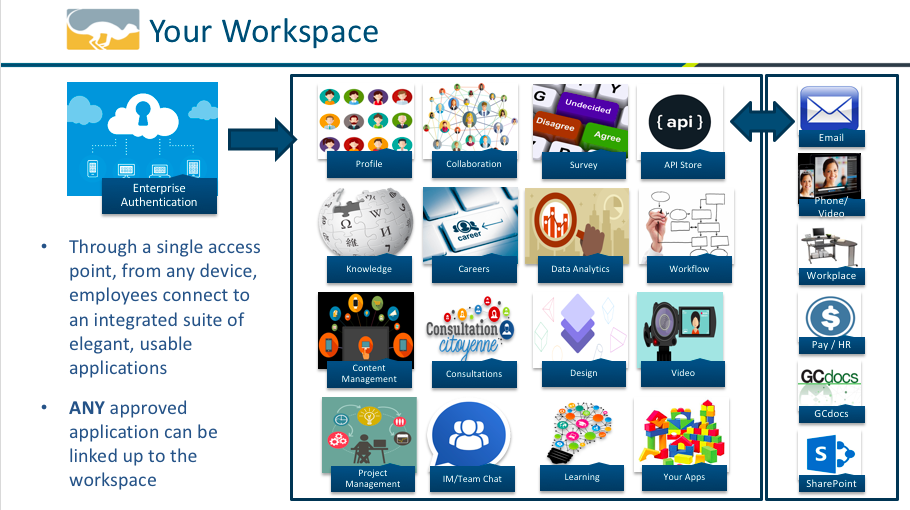User:Derek.alton
Project Meerkat - Creating an Open and Accessible Digital Workspace
to co-create an ecosystem of open source digital services designed to help government and civic partners connect and collaborate.
Objective: Develop an integrated network of universally accessible digital services that enable government and partners to share information and work together to create a better future for the people we serve.
Outcome: Organizational intelligence, improved efficiency and collective action.
Mission: Make it easy for employees, teams, organizations and partners to work together and reach their goals by providing the best access to the people, data, information and tools they need to do their jobs with excellence.
What might an open and accessible digital workspace look like?
Current services that are already being piloted include: LINKS
Get Involved:
To learn more about this open source project, read on! To get involved, contact the team at GCTools-OutilsGC@tbs-sct.gc.ca, join the discussion on either the GCcollab Group or GCmessage Channel. LINKS
Why Project Meerkat?
TBS initiated Project Meerkat to provide:
An open source appoach
Project Meerkat is a collaborative project that is open to partners across sectors and across countries. The Treasury Board of Canada Secretariat is currently the host of this project.
1) Design Principles:
These are the current working design principles for Project Meerkat, which will evolve as partners join and contribute.
Digital Principles are our principles! (link)
Working together: All levels of government, academia, partners and citizens will have full use of the workspace and be able to collaborate and interact with all content marked as open.
Working secure: Built to a Protected B standard, role-based permissions will allow public servants to work on official or sensitive content, while keeping partners aware by sharing less sensitive information.
Building open: By building the workspace using open source software, we can partner with anyone, anywhere and work with skilled, passionate communities at the forefront of software development. Our contributions to open source projects made will improve the accessibility and utility of these applications for everyone.
Building together: TBS is already partnering with the Netherlands on the development of the workspace and is in discussion with France, New Zealand and the USA on potential partnerships on workspace elements.
Building for everyone: Accessible design is good design. By building with accessibility as a core principle, we can empower our people to bring their diverse voices to the table to build a better Canada.
Embracing diversity: The workspace will be designed and realized working with partners around the world, bringing a uniquely Canadian perspective of many languages and cultures to engage our people and enable their work in a welcoming digital space.
What does it mean to build ‘open source’?
2) Development Model:
(Insert: OADW - Open Source Ecosystem Model slide from Deck)
Current services and related open source communities:
3) Partnership
This project can not be done alone, therefore we have developed a partnership model to make it easy for groups to quickly join and become part of this initiative. Specifically, we are looking to develop a first cohort of partners for 2018-2019 to help with the first stage of development for Project Meerkat.
Does this interest you? Contact Heather Laird at heather(dot)laird@tbs(dash)sct(dot)gc(dot)ca
Partnership Governance:
(insert governance picture) http://socialinnovation.ca/constellationmodel
(Click: https://en.wikipedia.org/wiki/Open-source_software to learn more)

